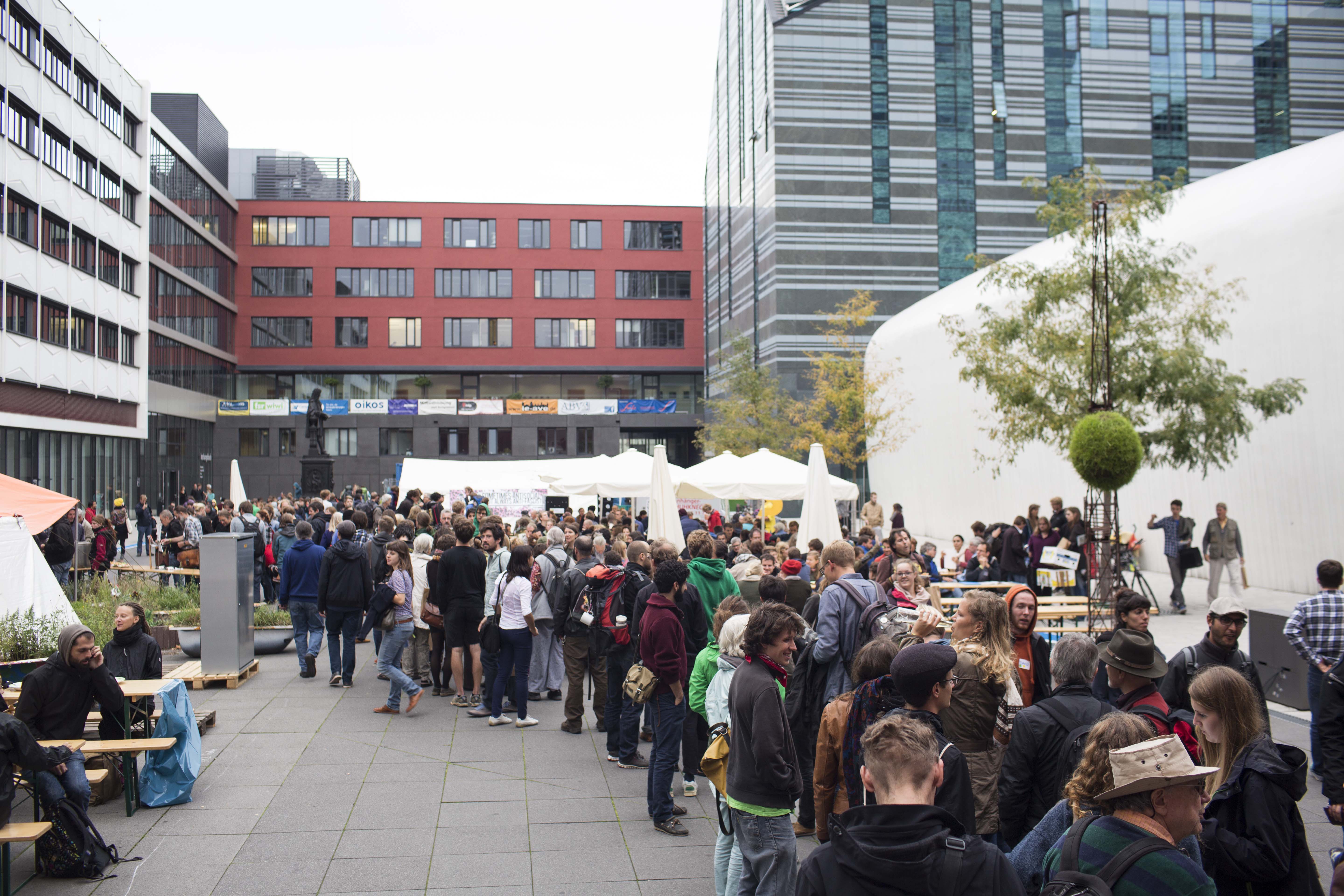Shortly before the most crucial UN climate change conference after the failure of Copenhagen, it seems that the international climate-movement is finally getting its act together: resistance against fossil fuel extraction is gaining ground and a rising global movement is putting pressure on institutions to divest their money from fossil fuels to finance renewables instead. Green jobs in the renewable energy sector have been a success story and it is broadly accepted that we need to keep 80% of the known fossil fuel reserves in the ground if we want to prevent runaway climate change. Last year, more than 400 000 people flooded the streets of New York City in the largest climate march in history and, as the global development of renewable energy increases in scale and efficiency, people are starting to believe in a transition away from fossil fuel dependency.
This is of course good news, and nobody concerned about climate change would seriously doubt that the global transition towards renewable energy is an absolute necessity. However, much as right-wing conservatives, mostly in the US, deny anthropogenic climate change, the majority of the climate movement tends to deny an equally important issue: that renewables are unable to maintain our Western growth-based consumer lifestyles on a global level.
The limitations and environmental impacts of renewables are being discussed in breadth and depth elsewhere; suffice to say here that e.g. wind mills and solar panels are very energy-intensive in production – and intensive in other natural resources too, such as metals, minerals and rare earths. Windmills for example require lots of concrete which is a highly CO2 intensive industry. Solar photovoltaic systems use on average 23-59 kg of aluminium per kW – the aluminium sector being another CO2 intensive industry. So the term "renewable" does not at all equal "unlimited". Not to mention the usual blind spots among green-tech enthusiasts - the growing aviation, transport and agro industry sectors for which no serious fossil-free scenarios for the mid-term future exist. Already, the competition for soil between food production, climate-relevant forests, energy plants, traffic and industrial infrastructure-sprawl is tense. What if we added millions of windmills and solar panels in order to generate electricity for transport? Or worse, energy crops to produce biofuels? And from where would we get the resources and energy to build up such massive infrastructure in the first place, including batteries?
On top if this comes the largely unquestioned assumption that the rightful demands of the poor in the Global South (and elsewhere) for better living conditions can only or best be met by following Western development and consumption patterns. From an environmental standpoint, this is an absurdity, even if we plastered the world with renewables as fast as possible. From a standpoint of social justice it cannot be denied that the same rights should apply to all – including the right of the South to choose the same "development" path as the North .
However, the countless social conflicts around the extraction and exploitation of environmental resources reveal the absurdity of this assumption from a social justice perspective too. As one after the other natural boundary is exceeded, the overuse of all kinds of natural resources is increasingly taking place at the expense of other people. Voicing the concerns of these people, the "environmentalism of the poor" movement therefore points to the linkage between social and environmental issues and calls for a different type of growth for the Global South. This includes, amongst others, different and radically democratic means to distribute, use and control natural resources as well as technology. As climate-justice activist Sunita Narain from India has put it:
[People in the South] "will need to rebuild security by rebuilding local food, water and livelihood security in all villages and cities of their world. And in doing this they will have to reinvent the capital- and material-intensive growth paradigm of the industrialised North, which deepens the divide between the rich and the poor. They will have to do things differently in their own backyards. But, more importantly, these countries will have to become the voice of the voiceless, so that they can demand changes in the rules of globalisation in the interest of all."
To be able to successfully develop a different type of growth, the countries of the South will require their fair share of the global resources and emissions - which must be much more than the leftovers of the rich North. By consequence the Global North will have to drastically reduce its emissions and resource exploitation. This is, however, impossible within the framework of continuous capitalist economic growth. According to a groundbreaking study from the UK, the early industrialized countries must reduce their greenhouse gas emissions by 8-10 percent every year to keep within their fair share of the assumed global carbon budget. The German Advisory Council on Climate Change (WBGU) translates this into individual carbon footprints of only 2,7 tons annually on global average. A simple comparison with e.g. the 11,2 tons the average German citizen emitted in 2011 shows that such heavy reduction cannot be achieved without dramatic changes in the affluent lifestyles of the majority in the Global North.
These figures apply to climate change only. When considered together with other planetary boundaries, it becomes even clearer that we can't simply rely on technological progress without overhauling the whole economic, social and political environment this progress is embedded in. As many examples in history show, purely technological solutions tend to relocate their negative effects to other sectors, ecosystems or continents, or from the present to the future.
If we want to have a fair chance to stop climate change at an acceptable degree, embracing the concept of climate justice is key, particularly in the Global North. Regardless of any ethical deliberations, it is a simple practical necessity. If we in the Global North with all our material overflow, capital and technological "progress" are unable to reduce our emissions to the required degree, we can’t realistically expect this from the Global South where Millions of people are still unable to meet their basic needs. Without the Global North contributing its fair share, e.g. the BRICS countries will neither be able nor willing to take on even more responsibility for keeping the climate safe – and the temperature will keep rising while the global community is debating fake solutions such as green growth.
Global security is yet another important issue to consider. There is evidence that climate change and resource constraints will lead to endless wars in the future and that drought and food scarcity have already contributed to the destabilization of the Middle East. The plight of the refugees currently drowning in the Mediterranean is only a glimpse of what will happen when climate change and other resource scarcities make large parts of the Earth uninhabitable. Viewed from this angle, it is obvious that social stability is a prerequisite for successful climate action, just as environmental justice and a stable climate are prerequisites for social stability. Desperate people don't care about the climate when their daily survival is at stake.
In order to keep our climate safe, it is important to reveal the connections between all current social and environmental struggles and climate change and to acknowledge that we have to turn away from the path of eternal economic growth. As the Canadian writer and activist Naomi Klein writes in her recent book "This Changes Everything", it's about nothing less than the decision between capitalism and our climate. The situation has culminated to produce a situation where all standard solutions will be insufficient. As for the international climate movement, this might be a unique chance in history to bring about systemic change – and the last chance for the climate. The arguments for a new economic and social paradigm beyond capital accumulation and constant economic growth have never been stronger.

In a recent article for Forbes, Corbin K Barthold makes several allegations against the idea of degrowth without having a clear understanding of the concept. He also includes some quotations - originally reported in a different article (by Aaron Timms) - from a vibrant classroom discussion which took place at the 2019 Degrowth Summer School hosted by the Institute of Environmental Scienc...
What does degrowth mean to you? By Marc Menningmann In this video, some of the scientists, activists and ordinary other participants who gathered at last year's Degrowth Conference in Leipzig share their personal understanding of degrowth. It shows how many different facets degrowth can have. Now we have added English subtitles to it which can be activated by clicking on the little green b...

By Christiane Kliemann When talking about building alliances - the focus of the third conference day - the issue of equality immediately comes into view, as there are many dimensions of inequality deeply rooted in the current growth-based economic model. In order to overcome this model, all these dimensions need to be addressed and all possible change-agents equally taken on board. Adelhei...